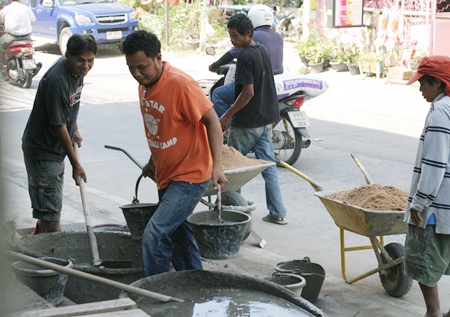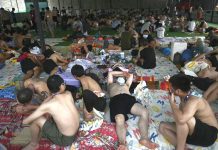The majority of Pattaya’s businesses are complying with the nation’s newly raised minimum wage, but an increasing number of layoffs and factory closures loom like worrying storm clouds on the horizon.
Most gas station, hotel and construction employees surveyed Jan. 5 say they’ve already been given raises to 300 baht per day, the second salary increase to boost minimum-wage workers in Chonburi and six other provinces since April. The Jan. 1 increase this time also applied to the kingdom’s 70 other states, standardizing wages nationwide.
 Thai workers working hard to build projects in Wong Amat, Naklua: their income depends on the contractors, who pay professional technicians above 300 baht.
Thai workers working hard to build projects in Wong Amat, Naklua: their income depends on the contractors, who pay professional technicians above 300 baht.
One worker at PTT Co.’s Jiffy service station in North Pattaya said he already has seen his pay rise, but acknowledged not all companies will be able to handle the added expense. Thai companies facing higher production costs can succeed, he said, by better training workers and improving their skill level.
Some employers, however, say the solution to paying workers more simply is to replace them with technology or migrant workers.
In Ranong, 32 companies are planning to import machinery to replace people. While the capital expenditure for the equipment is high, the long-term cost is lower than paying workers the new wage rate, the head of the province’s Federation of Thai Industries told the media.
Elsewhere, companies have begun importing Cambodian workers. More than 150 Khmer laborers with work permits crossed the border in Srakaew last week headed for guaranteed Thai factory jobs. While they must too be paid 300 baht per day, employers can deduct the cost of accommodations and utilities from their pay.
In all, 5-10 percent of Thailand’s labor-intensive businesses will close in the next three months due to higher wage expenses, national Federation of Thai Industries Vice Chairman Taweekit Chaturacharoenkhun predicted to the media. Some textile, agricultural and service businesses are already relocating to Cambodia, Laos and Vietnam, while others are cutting work days to survive.
Pattaya hotels, some with hundreds of workers, are again feeling the pinch of higher labor costs, after raising wages 40 percent to 273 baht in April. Most, however, can escape paying the full 300 baht flat salary by offering minimum wages of 6,500-7,000 baht per month, supplemented with tips that take salaries to up to 10,000 baht per month.
The wage increase is also the hot issue in the many construction camps in Wong Amat. Workers said day laborers are still being paid 280-290 baht per day – although those wages may be affected by accommodations deductions – but professionals are earning as much as 380 baht per day already.
One job foreman acknowledged that Thailand’s promise to pay even legal migrant workers 300 baht per day may make the kingdom even more attractive than working in Cambodia, where the minimum wage is a third of Thailand’s.
Thai politicians know that all too well. So, the same time as they raised migrant workers’ wages, they imposed a deadline for illegal foreign workers to register for a new “national verification” program designed to pursue legal status. International civil rights advocates claim the kingdom is now set to forcibly deport 1 million migrant workers, partly to create demand for Thai workers.
Of course, not all Pattaya companies are adhering to the new rules. The city’s hundreds of bars and go-go clubs are using loopholes – both genuine and contrived – to keep their mostly female workforce on a pay system that has existed since Pattaya serviced the rest-and-recreation needs of Vietnam War soldiers.
One Walking Street beer bar owner said he isn’t subject to minimum wage rules because he pays employees monthly based on a combination of flat wages, drink and “entertainment” quotas and punitive measures to eat away at salaries throughout the month.




